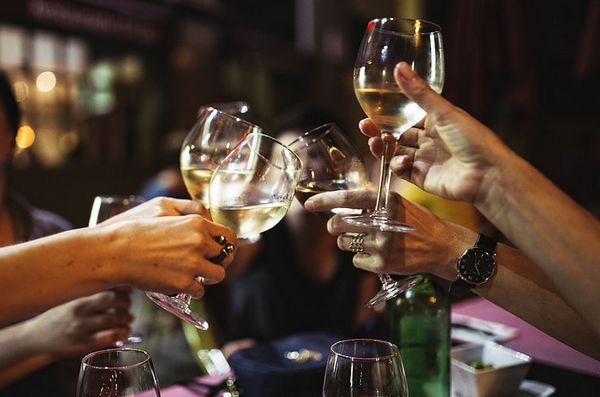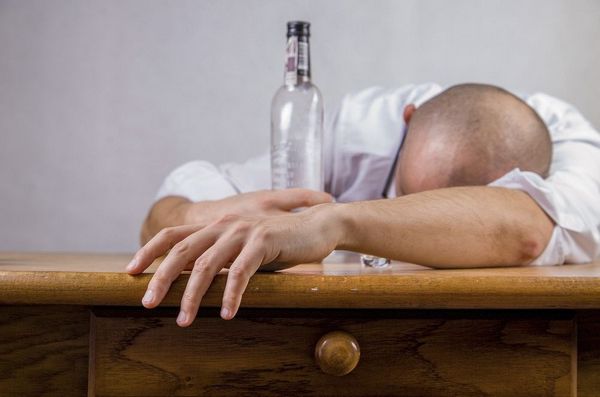Are you familiar with the unpleasant feeling after a night of drinking? You may be experiencing a hangover! Hangovers can cause fatigue, nausea and an overall foggy feeling that is difficult to shake off. In this blog post, we’ll discuss how to prevent hangover before drinking, so your night doesn’t turn into morning misery.
According to The National Institute on Alcohol Abuse and Alcoholism about 75% adults in the U.S. report having at least one hangover in their lifetime. Taking certain steps before drinking alcohol can help reduce or eliminate hangovers altogether!
How To Prevent Hangover Before Drinking

Taking supplements, drinking plenty of water, eating a hearty meal before drinking and getting enough rest can help reduce the risk of suffering from a hangover.
1. Consider taking supplements
Taking certain supplements before drinking alcohol can significantly reduce hangover symptoms. Research has shown that 20 different vitamins and compounds, including red ginseng, have been found to help with preventing a hangover.
In addition, L-cysteine is an amino acid supplement that helps reduce the effects of drinking by minimizing side effects such as nausea, headaches and anxiety. Taking preventive measures before you start your night out can also limit the severity of a potential hangover.
Not only can these supplements decrease symptoms but it’s important to stay hydrated, get plenty of rest and eat a hearty meal prior to even beginning to consume drinks in order to feel at least somewhat okay if too much alcohol is consumed.
2. Drink plenty of water
Drinking alcohol increases the body’s water losses, which means that alcohol acts as a diuretic. That’s why it is important to stay hydrated while drinking and prevent a hangover from developing.
Drinking plenty of water before, during, and after consuming alcohol can help reduce dehydration and the symptoms associated with it such as headache, thirst, fatigue and dizziness.
Additionally, drink lots of fluids like coconut water or sports drinks such as Gatorade in between alcoholic beverages; this will replace any electrolytes lost due to excessive drinking.
3. Eat a hearty meal before drinking
If you ask the best way on how to prevent hangover before drinking, then experts would suggest you to take a hearty meal high in fiber, proteins, and fats before you start drinking. Since alcohol is absorbed faster on an empty stomach, it’s especially important to consume fatty foods like avocados and bananas before starting your night.
These nutritious meals will provide lasting power to the body while slowing down the absorption of alcohol thus preventing extreme intoxication and reducing damage that could lead to a hangover.
So before popping open your favorite bottle or trying out a new alcoholic beverage be sure to eat something so you can stay safe from any avoidable post-drink symptoms!
4. Get plenty of rest before drinking to avoid fatigue.
Fatigue is an unpleasant side effect of drinking alcohol and can contribute to a more severe hangover. Ensuring that you’re well-rested before drinking can help reduce the severity of these effects and give you a better chance at avoiding a rugged morning after your night out.
It’s been shown that having adequate sleep leading up to consuming alcohol helps reduce fatigue, which makes it easier for your body to metabolize the alcohol in your system more quickly – alleviating many associated symptoms like headaches, dizziness, nausea, and dehydration upon waking up.
Getting enough rest also improves overall well-being when drinking; without proper rest leading up to it, even moderate amounts of alcohol can make you feel sluggish or confused due to its drowsy effects on the body.
How To Prevent a Hangover While You Drink

In the previous step, we discussed some methods on how to prevent hangover before drinking but if you did not get a chance to go through that and you started taking the drinks with your friends then what? So now we’ll suggest some tips that you can take while drinking to reduce the effect of alcohol and ultimately the effect of a hangover.
1. Avoid drinking on an empty stomach
It is highly recommended to not drink on an empty stomach if you want to reduce the severity of a hangover. Consuming food before drinking can help slow down the absorption rate of alcohol into your body which helps keep blood alcohol levels more in balance and minimizes various symptoms that come with a hangover such as extreme fatigue, dehydration, headaches, nausea or vomiting.
Eating something hearty like a burger or pasta safeguard your health by providing essential calories and vitamins and minerals that will be used during metabolism resulting in extended energy sources while also giving much needed sustenance against any potential effects from over-consumption.
Additionally, it’s important to remember that having a full stomach before drinking can help lower blood alcohol levels generally keeping them under control during and after consuming alcoholic beverages.
2. Stay hydrated
Staying hydrated can be an effective way to reduce the negative effects of alcohol and lower the chance of getting a hangover. Alcohol consumption increases urination, leading to dehydration; drinking water between alcoholic drinks can help prevent a hangover.
Make sure to have at least one glass full of water before going to bed – that’s probably the most important step in maintaining proper levels of hydration. Alternating between alcohol and water throughout your night out is equally beneficial; it helps keep blood alcohol content regulated and reduces chances for a morning headache.
Additionally, avoiding sugary mixers will also help maximize your resistance against feeling ill after having 1 too many drinks! Taking extra steps towards staying hydrated while you drink can go a long way in ensuring that you enjoy yourself without uncomfortable morning side-effects!
3. Limit alcohol intake by tracking drinks, avoiding shots, and sipping slowly
Keeping track of the number of drinks you have is key to preventing a hangover. Consuming alcohol too quickly can lead to dehydration, fatigue and sickness. It is recommended to measure your drinks and consume alcohol in moderation.
Avoid taking shots as they contain higher concentrations of alcohol which will increase intoxication more rapidly than sipping on beer, wine or mixed drinks. In addition, drinking slowly helps the body process one standard drink per hour which allows for better management over one’s alcohol consumption and its effects.
Lastly, try to avoid sugary mixers as they can result in a quicker spike in blood-alcohol level leading to further discomfort due to increased intensity of hangover symptoms afterwards such as headaches, dizziness and nausea.
4. Avoid mixing alcohol types and limit sugary mixers
Mixing types of alcohol and sugary mixers may seem like a good idea at the time, but it’s important to know which drinks are more likely to contribute to a hangover.
Consuming different types of liquor can intensify your experience by increasing the amount of sugar and chemicals in your body. Additionally, adding soda, juice or other sugary mixers might make drinking more enjoyable short-term but will increase dehydration levels and worsen any hangover overall.
Therefore, when consuming alcoholic beverages either avoid mixing drinks altogether or stick with one type and use calorie-free mixer options instead to help prevent nasty symptoms later on. If you’re looking for an effective way to counterbalance these effects then drink plenty of water throughout the night as dehydration is often associated with headaches post binge*.
5. Stop drinking well before bedtime and rehydrate before sleeping
Alcohol consumption can lead to dehydration, as it prevents the body from releasing the water it needs for daily functions. Dehydration can cause headaches, nausea, and fatigue—common hangover symptoms.
It’s important to not drink alcohol on an empty stomach but also important to stop drinking well before bedtime and rehydrate before sleeping to prevent or reduce a hangover. This is because as time passes during sleep, our bodies become dehydrated due in large part to not having enough liquid stored up after drinking alcohol all night long.
So make sure you keep replenishing your liquid levels with cold water or other non-alcoholic beverages throughout the duration of your night out by having one glassful of non-alcoholic beverage between each alcoholic one – this will help you stay hydrated without over-intoxication.
How To Cure a Hangover

Rejuvenate your system with a combination of sleep, food and light exercise to cure a hangover. Read on to find out more!
1. Get enough sleep
Getting enough sleep is important for preventing or managing a hangover. Alcohol disrupts the second part of sleep, leading to poorer quality sleep and making us more vulnerable to its effects.
Taking naps when experiencing hangover symptoms can be an effective way to alleviate them because even a short nap can help restore impaired alertness and cognitive functioning during the daytime due to alcohol-induced changes in our natural 24-hour rhythm.
Therefore, it’s not just getting enough rest before drinking, but also after drinking that’s essential for recovery from a hangover since actually getting adequate physical rest helps reduce inflammation from chronic dehydration caused by alcohol intake as well as boosting your body systems functions necessary for release of hormones like cortisol needed when hungover.
2. Eat a hearty breakfast
Eating a good breakfast can be key in helping to avoid a hangover. A hearty, calorie-rich meal gives your body the nutrients it needs and replenishes energy levels – both of which are depleted when drinking alcohol.
Studies have shown that regular meals can also reduce people’s blood alcohol level by slowing the absorption rate of alcohol into your system, ensuring you’re not as running on empty if you do drink too much.
Eating a nutritious breakfast will provide essential vitamins, minerals and other nutritional benefits to your bloodstream, preventing dehydration while protecting liver cells from further damage caused by excessive alcohol intake.
3. Take anti-nausea medication if experiencing nausea
Taking anti-nausea medication can be an effective way to reduce the signs and symptoms of a hangover. There are two main categories of medications used for treating nausea or vomiting caused by alcohol consumption: over-the-counter medicines and prescription drugs.
Over-the-counter medicines such as Pepto Bismol, Dramamine, and Zofran can help alleviate nausea associated with a hangover due to their active ingredients like dimenhydrinate, bismuth subsalicylate, or ondansetron.
If you’re dealing with more severe symptoms though it might be necessary to see your doctor for a prescription medicine such as Compazine or Reglan instead. Ginger has also been found to provide some relief from nausea triggered by various factors including alcohol consumption; ginger supplements are widely available at drug stores in both tea form and capsule form.
4. Get light exercise such as yoga or a walk
Light exercise can be a great way to help ease the symptoms that come after drinking too much. Low-impact activities such as yoga or a walk will improve blood flow, helping your body recover more quickly, and aiding cellular metabolism – making it easier for your organs to process the alcohol in your system.
Exercise releases endorphins and other hormones that help you feel better and reduce cravings related to withdrawal. However, exercise should be done with caution when hungover: if you push yourself too hard dehydration or further fatigue could ensue, potentially worsening hangover symptoms.
A light workout like stretching is best for relieving some of the harsher effects of overconsumption of alcohol while providing mental clarity and energy benefits typically associated with regular exercise.
5. Try natural remedies like ginger and electrolyte replenishment
Ginger has anti-nausea properties and can help with digestion while reducing symptoms of hangovers. Try sipping on ginger tea or chewing some slices of pickled ginger for relief from an upset stomach associated with drinking alcohol.
Coconut water is also a great natural remedy for restoring electrolytes to your body, helping to alleviate bloating, dizziness, headache, fatigue and other hangover-related symptoms.
Don’t forget to drink plenty of plain water too in order to prevent dehydration caused by alcohol consumption.
Conclusion
It is clear that the most effective way to prevent a hangover is to drink in moderation, stay hydrated, and get plenty of rest before and after. In fact the best tip on how to prevent hangover before drinking is to Eat fatty foods prior to drinking, this can delay the absorption of alcohol.
Additionally, making sure you don’t mix different types of alcohol or have sugary drinks as your choice (which lead to surges in blood sugar levels) can help mitigate symptoms if you do get one.
There are also supplements such as Over EZ and Pedialyte which are known for reducing hangover-related effects by helping liver enzymes naturally break down chemicals found in alcoholic beverages.
If all else fails and unfortunately you wake up with debilitating symptoms; some natural remedies, such as ginger tea or electrolyte sachets out there may help provide some relief.
Ultimately it’s important to remember that there isn’t one golden answer when it comes preventing – or curing -a hangover since everyone’s body chemistry responds differently to alcohol consumption.

